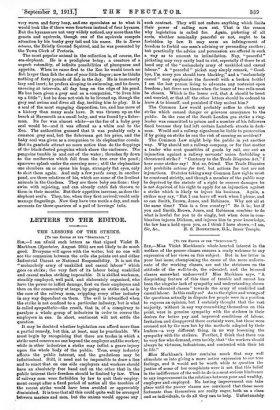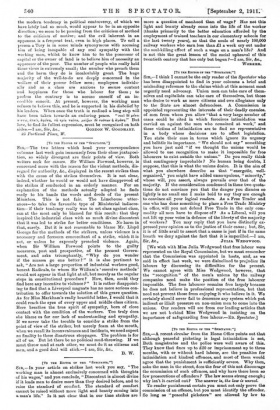[To THE EDITOR OP THY "SPECTATOR."] SIR, —Miss Violet Markham's whole-hearted
interest in the welfare of the poorer classes ensures a ready welcome to any expression of her views on this subject. But in her letter in your last issue, championing the cause of the more unfortu- nate of the working classes, are not the strictures on the attitude of the well-to-do, the educated, and the leisured classes somewhat undeserved P Miss Markham says, "A disquieting feature of this time of trouble and unrest has been the singular lack of sympathy and understanding shown by the educated classes " towards the army of unskilled and casual labour. Is this really so? As to the rights and wrongs of the questions actually in dispute few people were in a position to express an opinion, but I certainly thought that the vast majority, without in any way committing themselves on this point, were in genuine sympathy with the strikers in their desires for better pay and improved conditions of labour. Irritation and disapproval there certainly were, but these were aroused not by the men but by the methods adopted by their leaders—a very different thing, in no way lessening the sympathy with the strikers. Further, I think that there can be very few who demand, even tacitly, that " the workers should always be virtuous, industrious, and contented with their lob in life."
Miss Markham's letter contains much that may well stimulate us into giving a more active expression to our true feelings, and it would not be worth while to question the justice of some of her complaints were it not that this belief in the indifference of the well-to-do is a most serious hindrance to any improvement in the relations between poor and wealthy, employer and employed. No lasting improvement can take place until the poorer classes are convinced that those more fortunate than themselves are really eager, both as a class• and as individuals, to do all they can to help. Unfortunately.
the modern tendency in political controversy, of which we have lately had so much, would appear to be in an opposite direction ; we seem to be passing from the criticism of method to the criticism of motive ; and the evil inherent in an opponent is a frequent text, even in high places. To call a person a Tory is in some minds synonymous with accusing him of being incapable of any real sympathy with the working man, whilst to know him to be the possessor of capital or the owner of land is to believe him of necessity an oppressor of the poor. The number of people who really held these views is extremely small; the number who preach them and the harm they do is incalculably great. The huge majority of the well-to-do are deeply concerned in the welfare of their poorer fellow men; employers individu- ally and as a class are anxious to secure content and happiness for those who labour for them ; to profess the contrary is to accuse oneself of an in- credible conceit. At present, however, the working man refuses to believe this, and he is supported in his disbelief by his leaders. When once the truth is realized a long step will have been taken towards an enduring peace. "Feel Si 11.6E t worts, a-ydwn, Tit Tpta Tairra, latiCtev Sf TotiTow i7 iyciirrj." But love, to find its fullest expression, must be recognized on both







































 Previous page
Previous page